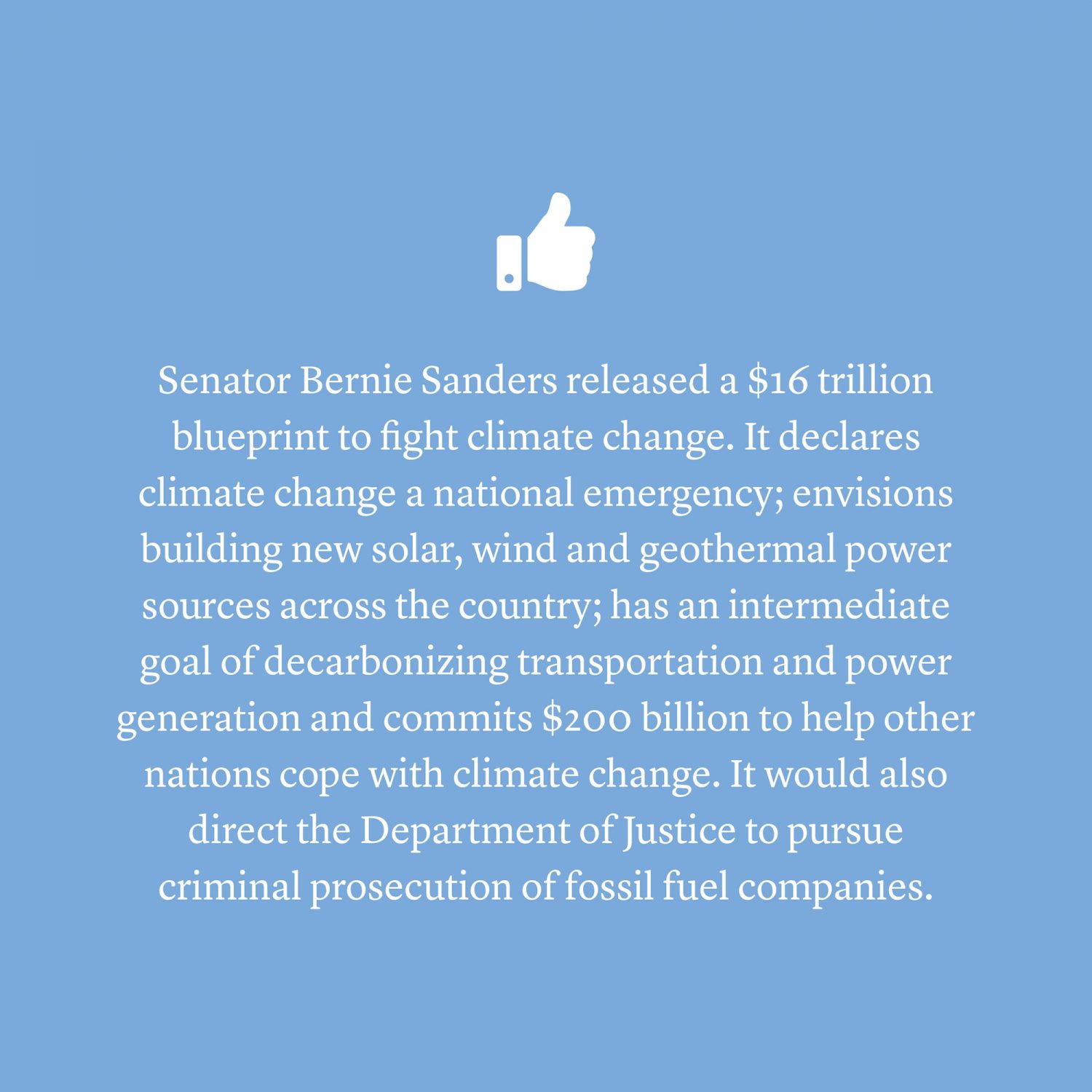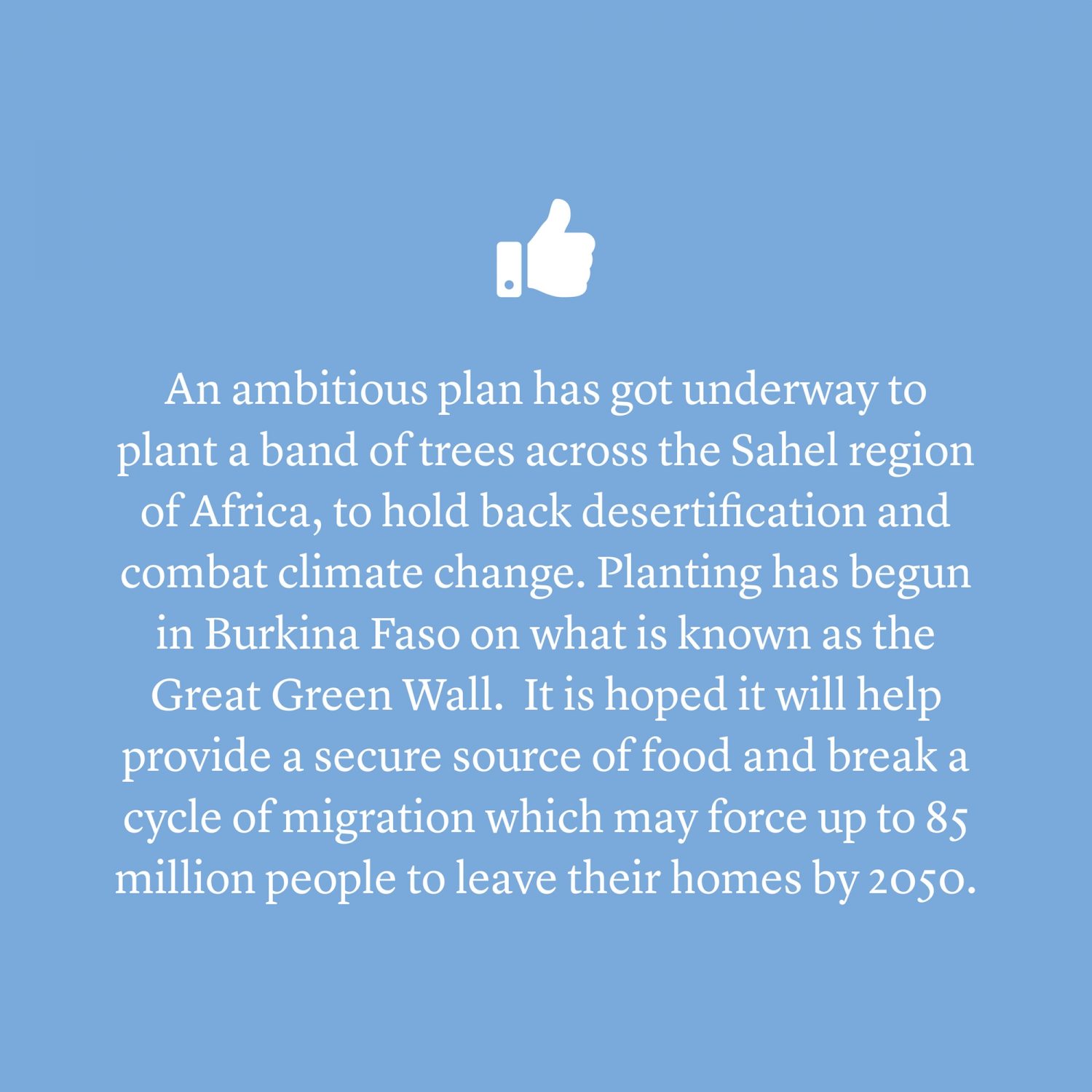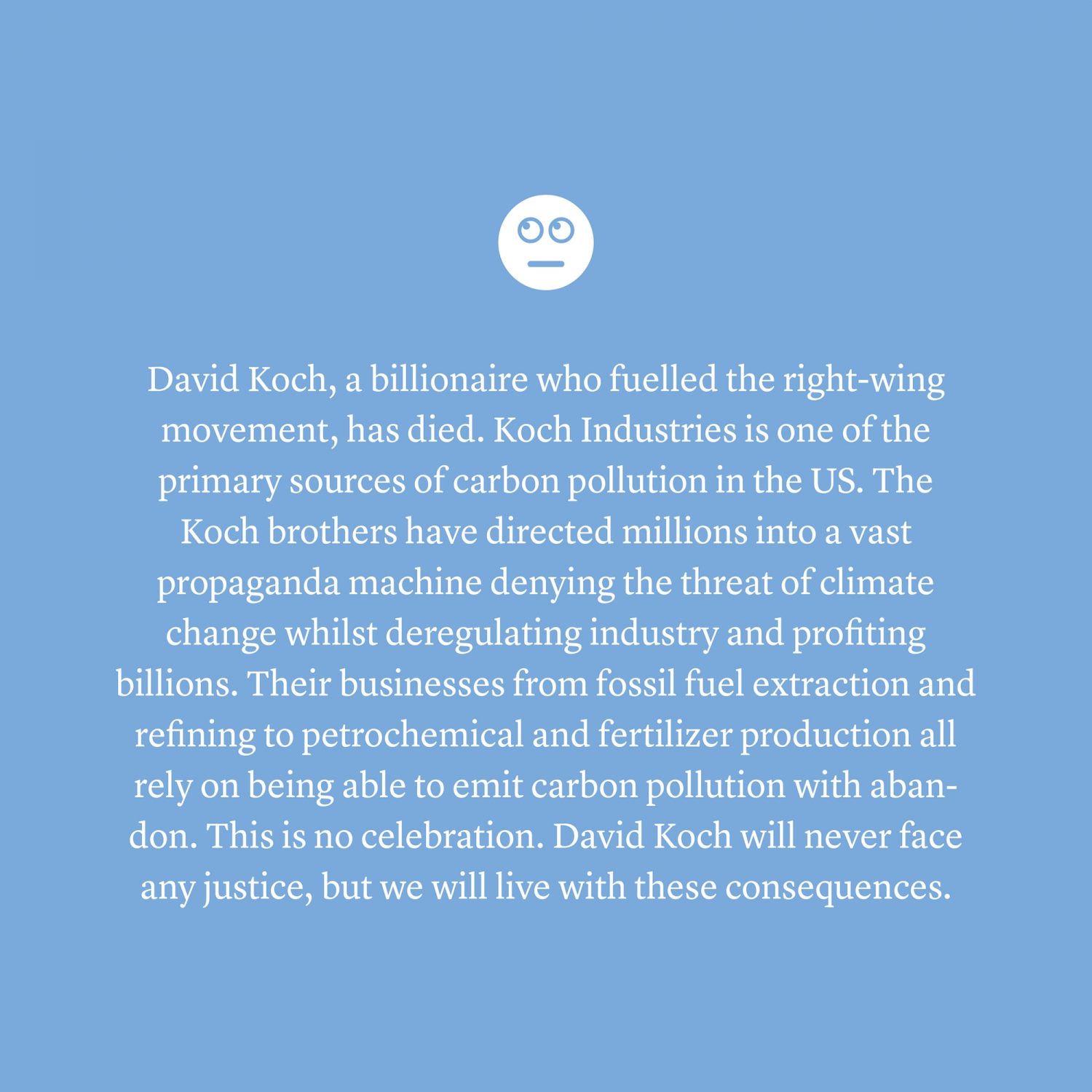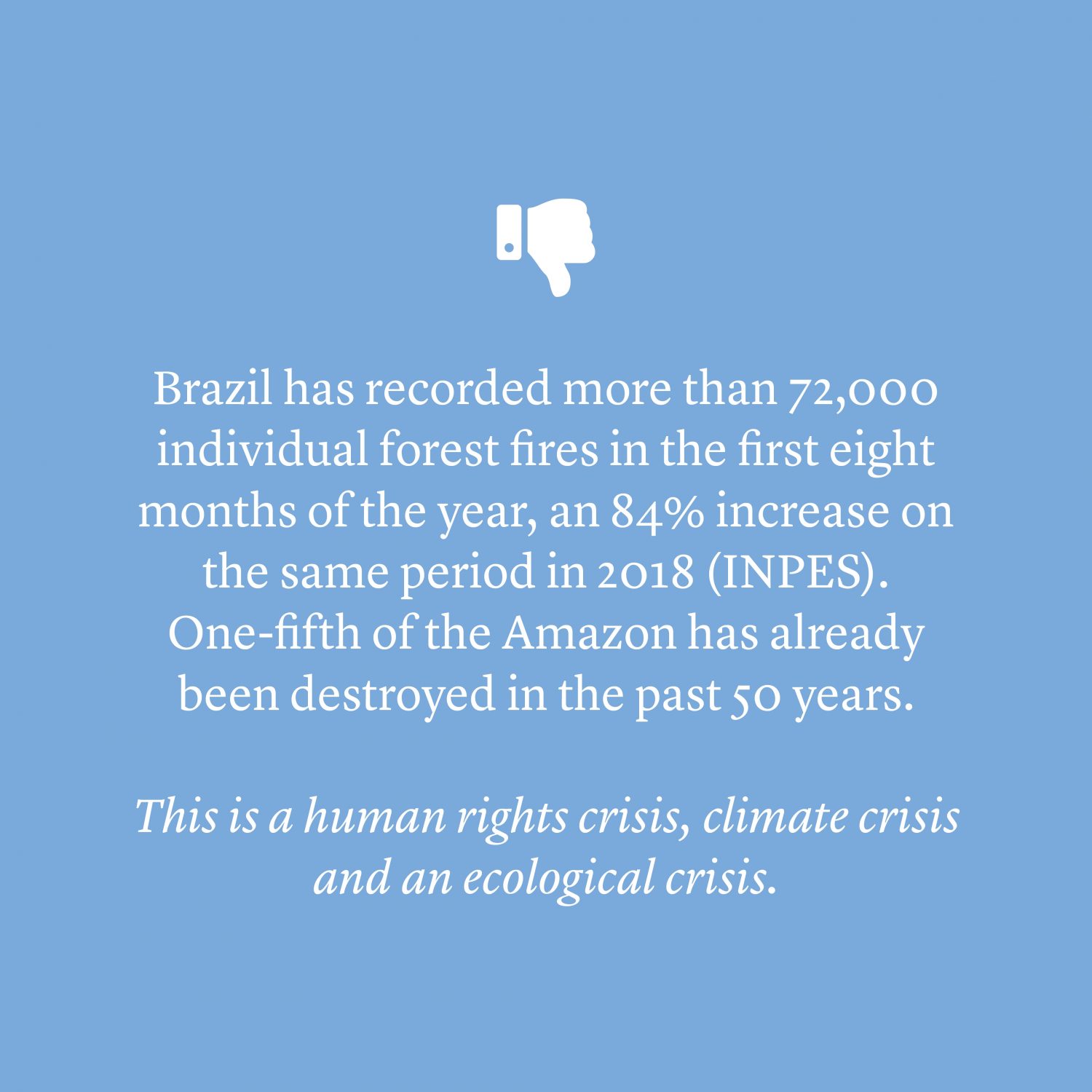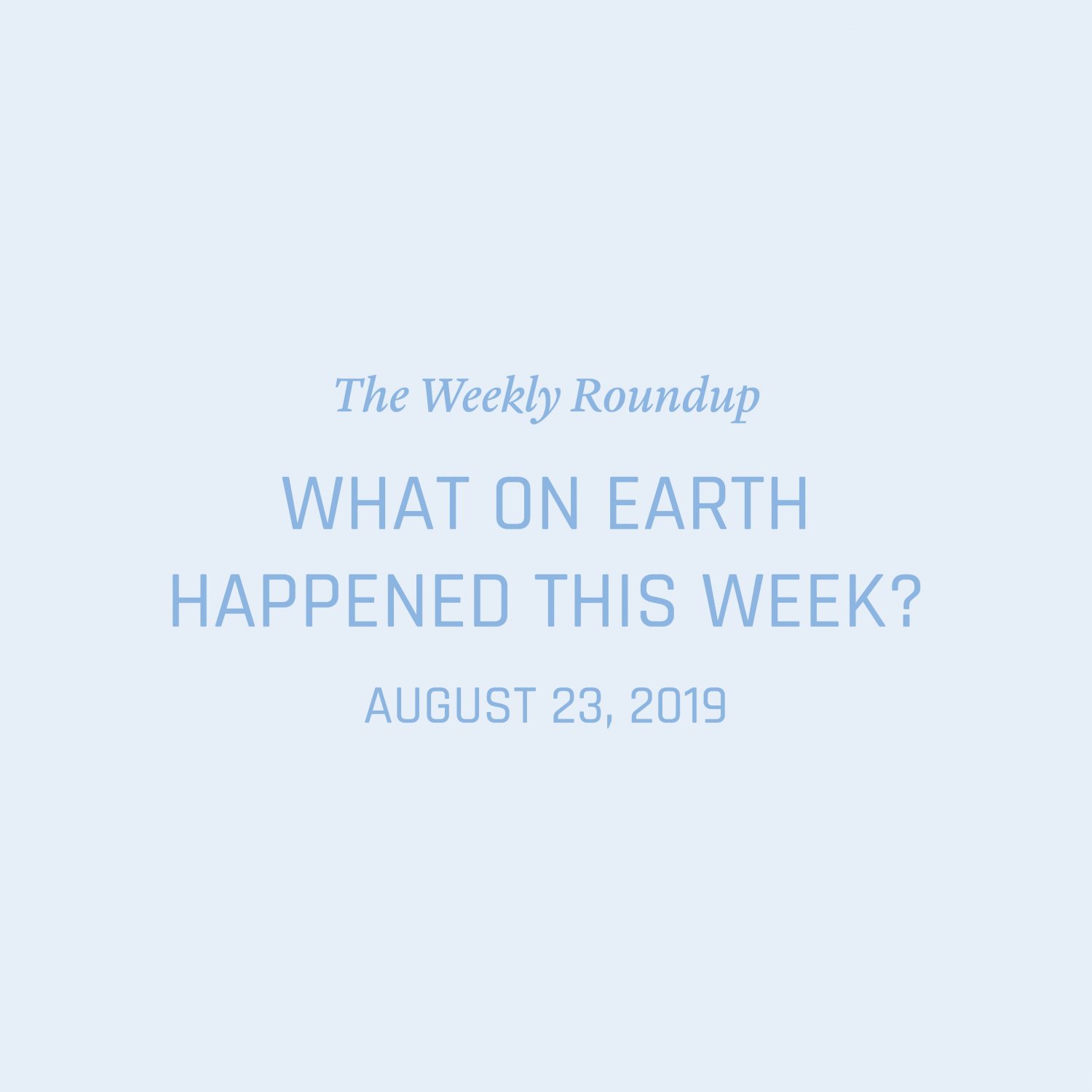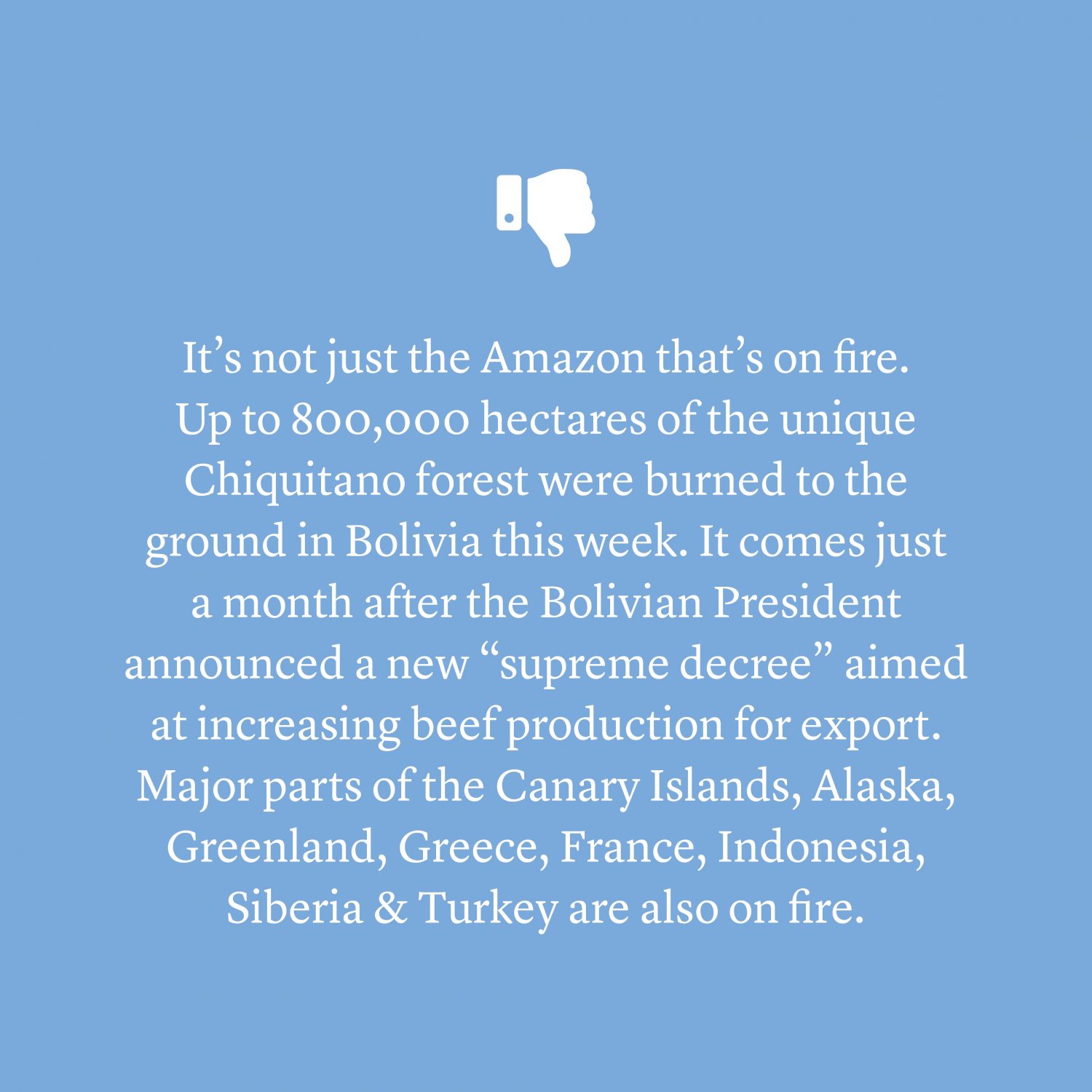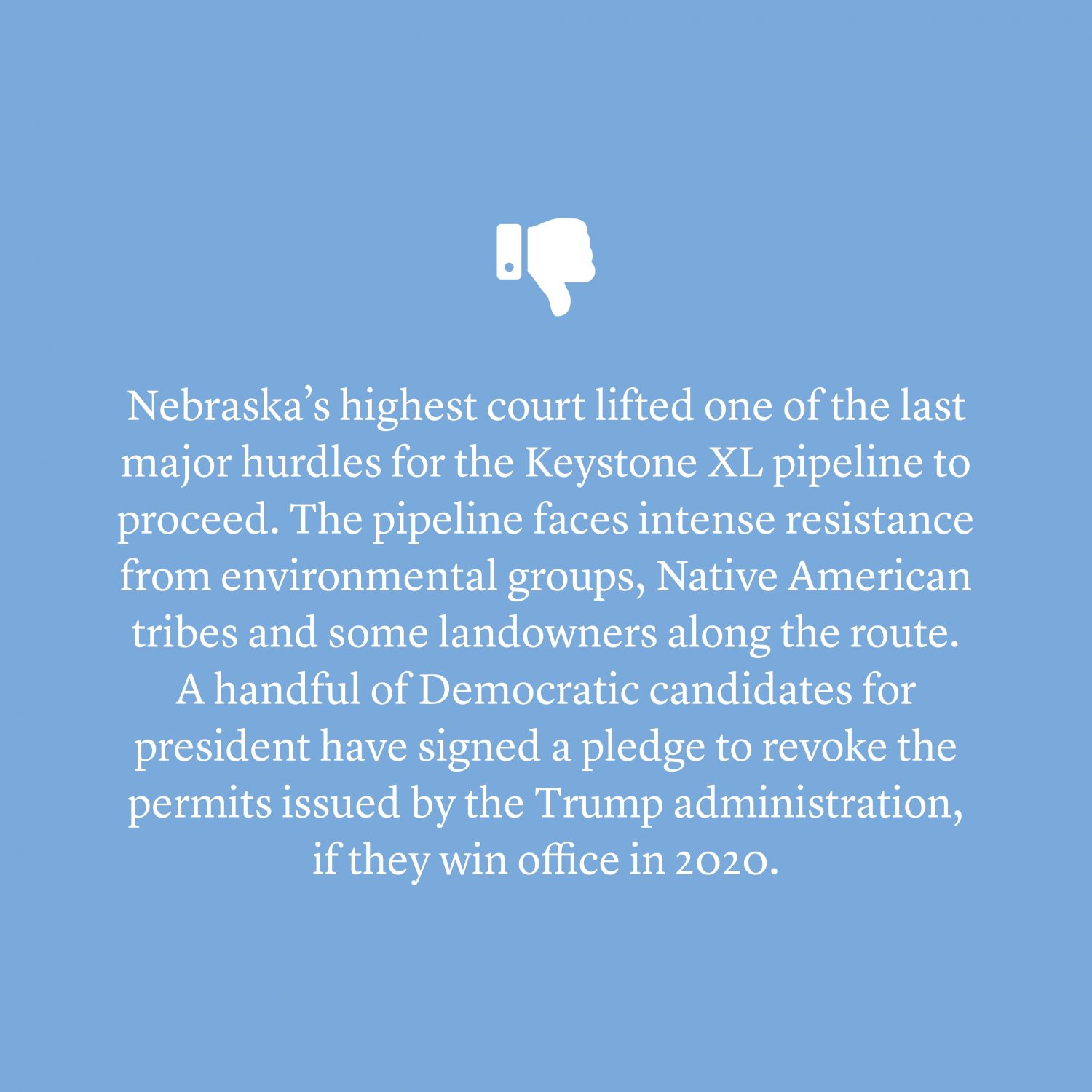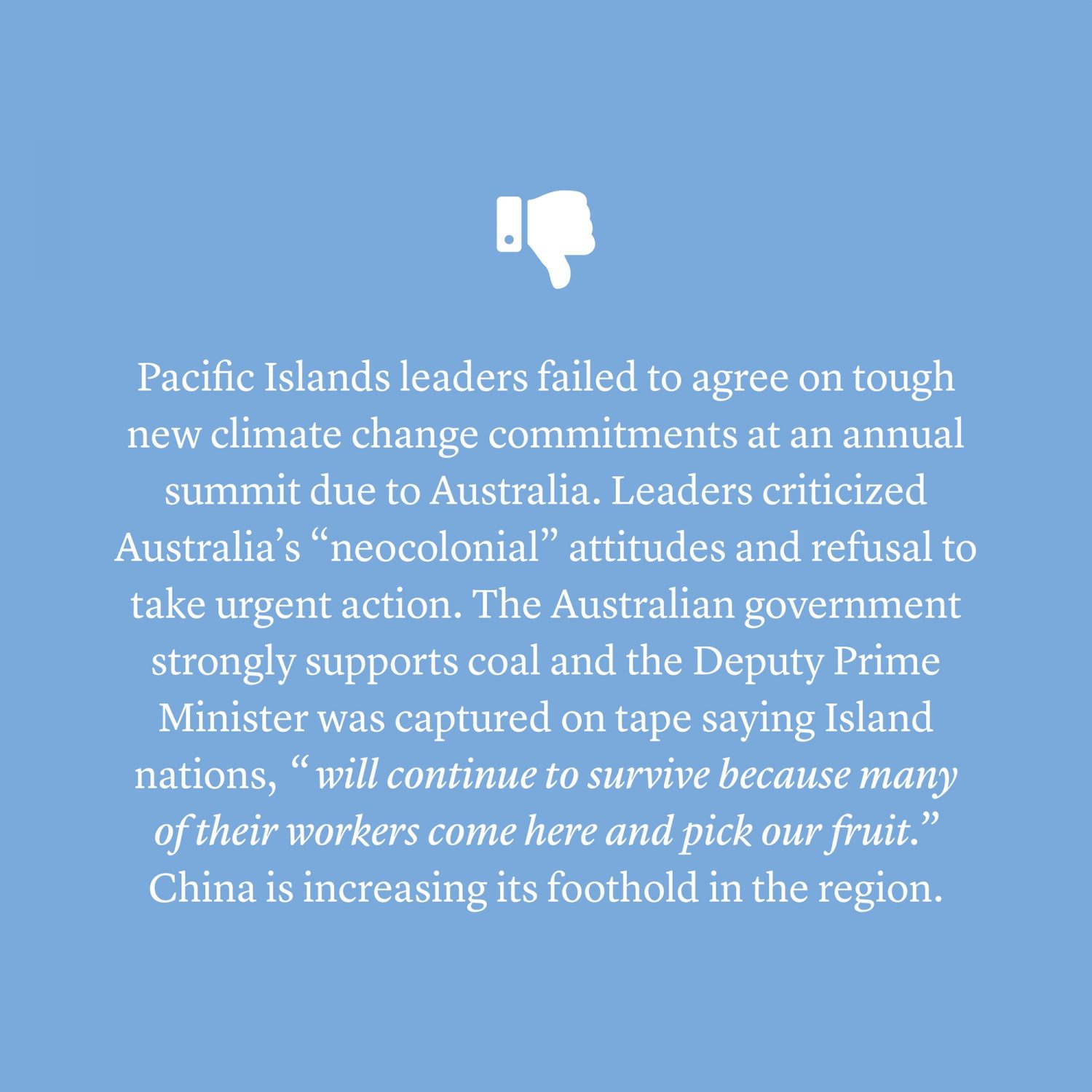Brazil / Deforestation
1/ Brazil has recorded more than 72,000 individual forest fires in the first eight months of the year, an 84% increase on the same period in 2018 (according to Brazil’s National Institute for Space Research). Fires are a natural part of many ecosystems, but not in the Amazon, where they are an almost entirely human-caused phenomenon. Most of these have been set by farmers clearing their land. The vital rainforest is nearing a “tipping point” in which a third of its ecosystem could be irreversibly decimated, after which it will irreversibly degrade into a dry savannah, experts have warned. One-fifth of the Amazon has already been destroyed in the past 50 years. President Emmanuel Macron (France) accused President Jair Bolsonaro of Brazil of lying about being committed to fighting climate change and said he would try to kill a major trade deal between Europe and South America that has been years in the making. Greenhouse gas emissions linked to deforestation are the second-biggest cause of climate change. Our note: this is a human rights crisis, climate crisis and an ecological crisis. (NYT / Independent / The Intercept / The Guardian / National Geographic)
World / Climate Change
2/ It’s not just the Amazon that’s on fire. Up to 800,000 hectares of the unique Chiquitano forest were burned to the ground in Bolivia between August 18 and August 23. That’s more forest than is usually destroyed across the country in two years. The Chiquitano dry forest in Bolivia was the largest healthy tropical dry forest in the world. The forest is home to Indigenous peoples as well as iconic wildlife such as jaguars, giant armadillos, and tapirs. Some species in the Chiquitano are found nowhere else on Earth. It’s thought that the fires were started deliberately to clear the land for farming, but quickly got out of control. The disaster comes just a month after the Bolivian President announced a new “supreme decree” aimed at increasing beef production for export. In other fires, more than 9,000 people were evacuated as flames spread this week across Spain’s Canary Islands. Wildfires also ignited this week in Alaska. Denmark dispatched firefighters to Greenland to control fires burning close to population centers. Major wildfires have also burned through Siberia, and environmental activists expect them to set a new record for burn area in Russia by the end of the season. Parts of Greece, France, Indonesia and Turkey are also on fire. (The Conversation / Vox / The Guardian)
World / Climate Change
3/ The world is gradually becoming less green, scientists have found. Plant growth is declining all over the planet, and new research links the phenomenon to decreasing moisture in the air—a consequence of climate change. Since the late 1990s, more than half of the world’s vegetated landscapes have experienced a growing deficit, or drying pattern. (Scientific American / Science Advances)
World / Plastics
4/ Scientists in Germany are raising the alarm after finding a significant amount of microplastics in snow samples in the Alps and the Arctic — two of the most pristine locations on Earth. While it’s known that microplastics and other plastic debris is transported by ocean currents, scientists have become increasingly convinced that small plastic fragments are also being carried through winds and precipitation. (Science Advances / Huffington Post)
Iceland / Climate Change
5/ Iceland has marked its first-ever loss of a glacier to climate change as scientists warn that hundreds of other ice sheets on the subarctic island risk the same fate. “In the next 200 years all our glaciers are expected to follow the same path. This monument is to acknowledge that we know what is happening and what needs to be done. Only you know if we did it,” the plaque reads. (The Guardian)
Oceana / Climate Change
6/ Pacific Islands leaders failed to agree on tough new climate change commitments at an annual summit. Leaders have called for Australia to be ousted from the region’s main regional grouping, criticizing Canberra’s “neocolonial” attitudes and refusal to take urgent action on climate change. Australia was against adopting the tough new standards. The Australian government is a firm supporter of the coal industry. Deputy Prime Minister Michael McCormack was captured on tape saying, “they will continue to survive because many of their workers come here and pick our fruit.” Our note: China has been making moves in the region and is increasingly seen as the lesser of two evils. (Reuters / The Guardian / ABC / Japan Times)
USA / Climate Change
7/ Nebraska’s highest court lifted one of the last major hurdles for the Keystone XL pipeline on Friday when it rejected another attempt to derail the project by opponents who wanted to force the developer to reapply for state approval. The pipeline faces intense resistance from environmental groups, Native American tribes and some landowners along the route. Barack Obama’s administration studied the project for years before finally rejecting it in 2015 because of concerns about carbon pollution. Donald Trump reversed that decision in March 2017. Federal approval was required because the route crosses an international border. (The Guardian / NPR)
The good news…
Africa / Environment
8/ An ambitious plan has got underway to plant a band of trees across the Sahel region of Africa, to hold back desertification and combat climate change. It covers parts of Senegal, Mauritania, Mali, Burkina Faso, Niger, Nigeria, Chad and Sudan to Eritrea. Planting has begun in Burkina Faso on what is known as the Great Green Wall. It is hoped the line of vegetation will help the region’s people plant more crops and provide a secure source of food, improved health and thousands of new jobs. It could also help to break a cycle of migration which may force up to 85 million people to leave their homes by 2050. (UN)
USA / Climate Change
9/ Senator Bernie Sanders released a $16.3 trillion blueprint to fight climate change, the latest and most expensive proposal from the field of Democratic presidential candidates aimed at reining in planet-warming greenhouse gases. It declares climate change a national emergency; envisions building new solar, wind and geothermal power sources across the country; and commits $200 billion to help poorer nations cope with climate change. The plan also calls for an intermediate goal of decarbonizing transportation and power generation, the two largest sources of emissions in the United States, by 2030, which would lower US emissions by 71 percent. (NYT / The Intercept / Vox)
USA / Climate Change
10/ Our note: We’re low on good news this week, very, very low. So we’re not celebrating the death of David Koch, of the famed Koch brothers who helped destroy our world whilst profiting from the destruction, but it does help just a little that there’s only one of them left now. It’s more a mourning of the justice he will never face. Just the other week Patriot Act did an episode on how the Koch brothers fight against public transport so they can profit.
Their note: Koch Industries is one of the primary sources of carbon pollution in the United States. Charles and David Koch have directed many millions of their net worth into a vast propaganda machine denying the threat of global warming pollution. While Koch certainly enjoyed the fruits of his labors to deregulate U.S. industry and reduce taxes on the super-wealthy like himself, he will never have to experience the consequences of his biggest achievement: putting the entire planet on the brink of crisis in the service of enriching himself and a few other fossil fuel billionaires. And we, the people and future generations who are going to live with the fallout, will never see him or the small cadre of wealthy conservatives who funded decades of climate denial face any form of justice. The Koch brothers’ businesses from fossil fuel extraction and refining to petrochemical and fertilizer production all rely on being able to emit carbon pollution with abandon. (NYT / Gizmodo / Think Progress / NYT 2)
Other notables…
- Peru’s Los Amigos Biological Station has teamed up with conservation organizations to use precision conservation tools to patrol against invading artisanal miners and illegal loggers are drones, acoustic monitoring, machine learning, lidar and thermal imaging — all applied to protecting one of the most biologically diverse regions on Earth. (Mongabay)
- Delegates from more than 180 countries are gathering for the meeting of the Convention on International Trade in Endangered Species (Cites). The Cites meeting, held every three years, will discuss a record 56 proposals submitted by governments to the Conference of the Parties, known as COP18. Key among the items on the agenda will be competing ideas on how to protect African elephants, which have seen a huge decline in numbers due to poaching over the past 20 years. (BBC / The Guardian)
- After sustained public outcry, the Trump administration has voided its decision to reauthorize controversial cyanide traps for killing wildlife. The traps are most frequently used by Wildlife Services, a little-known federal agency inside the United States Department of Agriculture, to kill coyotes, foxes and other animals at the behest of private agriculture operators. (The Guardian)
- The US and Mongolia are backing a ban on the trade of a critically endangered species of antelope that has seen its numbers in the central Asian steppes devastated by hunting and disease. (New Scientist)
- UNEP, UN Human Rights Office sign new agreement, stepping up commitment to protect the human right to a healthy environment. (UN Environment)
- For a long time, scientists had suspected that man-made climate change was likely causing West Antarctica’s ice to thin, but they had not established a direct connection or mechanism. Now a new study published appears to have solved the puzzle. A team of researchers in the U.S. and the U.K. found that global warming has caused a shift in wind patterns that are ultimately bringing more warm ocean water into contact with the region’s ice. (Scientific American / Nature)
- Large numbers of salmon died prematurely in some Alaskan rivers in July according to local reports, and scientists believe the cause could be the unprecedented heatwave that gripped the state last month. (Independent)
- An orphaned dugong named Marium, who became an internet star after being rescued in Thailand, has died. An infection caused by ingesting plastic contributed to her death. Dugongs are vulnerable to extinction, with up to only 250 believed to be living in Thai waters. (The Guardian)
- The expansion of human populations has left animals such as white-lipped peccaries, jaguars, giant anteaters, white-tailed deer and tapirs isolated throughout Panama. The animals live in forest “islands,” surrounded by cattle ranches, fields of crops, roads and other human developments that jeopardize their ability to move from one place—and, correspondingly, from one group—to another. (Scientific American)
- Research, published in Nature Climate Change, found a warming planet will also alter ocean waves along more than 50% of the world’s coastlines. (The Conversation)
- Washington Gov. Jay Inslee, focussed on climate change, announced Wednesday that he is ending his campaign for the presidency. (Vox)
- Australia will ban the domestic trade of ivory and rhino horn, with state and territory environment ministers to discuss how to enforce the outlaw later this year. (ABC)
- Australia is taking at least six years to list habitats as threatened under national environment laws, an inquiry examining the country’s extinction crisis has heard. (The Guardian)
- From August 19 to 30, an intergovernmental conference will convene at the United Nations in New York to continue negotiations toward a treaty to ensure the conservation and sustainable use of the high seas—the two-thirds of the world’s ocean beyond the jurisdiction of any country. (Pew)
- A panel of the Democratic National Committee on Thursday rejected a proposal to host a single-issue debate on the climate crisis. (Huffington Post)
- Researchers in Sri Lanka have described an eye-catching new species of tarantula, a shiny, metallic-blue tarantula, in a discovery they hope will underscore ongoing efforts to better regulate the global trade of rare and exotic spiders. (Mongabay)
- Fracking has been halted at UK’s only shale gas exploration site after it triggered the largest earthquake caused by the practice to date. (Independent)
- The UK will miss its legally binding net-zero 2050 target with “dire consequences” unless climate policies are rapidly implemented, MPs have warned the government. (Independent)
- Sydney’s dam storage levels have dropped below 50% for the first time in more than a decade. Sydney has been on stage one water restrictions since May. More than 65 per cent of Queensland is already drought-declared. Stanthorpe and Warwick residents already face “extreme-level” water restrictions of 120 litres per person a day. After another year of drought, the Northern Territory is also facing water shortages. (The Guardian / Brisbane Times / Country Life)
